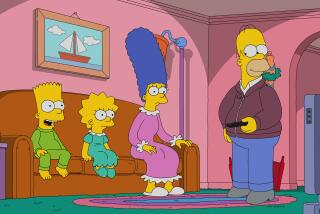D’oh!
- Share via
It’s no secret that the animated television series “The Simpsons” has fans around the world; last weekend’s chart-topping overseas ticket sales for its spinoff movie only underscored the point. What’s puzzling is why. How did an ignorant, doughnut-scarfing “Ugly American” father and his mustard-tinged brood win fans in Auckland, Argenteuil and Argentina?
Maybe it’s that cartoons transcend borders, or that the series’ long run -- 18 seasons, 400 episodes and counting -- has given fans an unparalleled opportunity to intimately know not only a fictional family but an entire fictional town. Maybe it’s just that the show is really, really funny.
Or perhaps “The Simpsons” taps into a need to belittle the world’s only remaining superpower. The show has set the standard for American cultural satire, skewering politicians, pop stars, seminarians and scientists with equal glee. Anti-Yank mockery might play a part when half the participants in a BBC poll rank bumbling paterfamilias Homer Simpson the greatest American ever -- with runners-up the Rev. Martin Luther King Jr. and Abraham Lincoln earning less than 10% of the vote each.
But animus toward the United States doesn’t explain the kind of goofball mania that inspired a New Zealand town to erect a 12-foot-tall sculpture of a pink doughnut (Homer’s favorite food) or a newspaper in Argentina to sponsor an “Argentine Homer” contest. Series creator Matt Groening has suggested that people everywhere relate to “The Simpsons” because “the love of stupidity is universal.” Al Jean, the movie’s producer, may hit closer to the mark when he suggests that Homer, the emotional heart of the show, is Everyman. People understand a guy who falls asleep on the job, lives for his beer and fibs foolishly to his family -- yet still loves them deeply and truly.
Whatever the appeal, the worldwide success of “The Simpsons Movie” marks a positive moment for American culture. In a 1992 speech to a group of religious broadcasters, then-President George H.W. Bush proclaimed that “we need a nation closer to the Waltons than to the Simpsons.” He lost the election. “The Simpsons” won. With humor, it presents a slice of American life encompassing clannishness and diversity, ignorance and smarts, prejudice and love, hypocrisy and good intentions -- in other words, humanity in all its Technicolor variety. As matriarch Marge Simpson might say, Homer and his neighbors get the world to laugh with us, not at us. That can only be a good thing.


